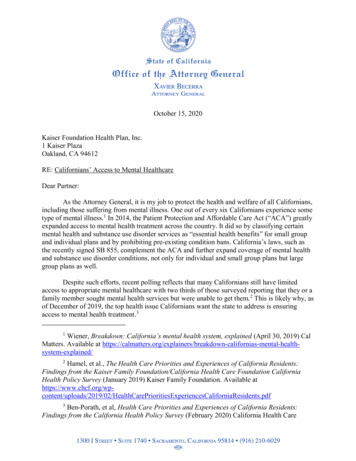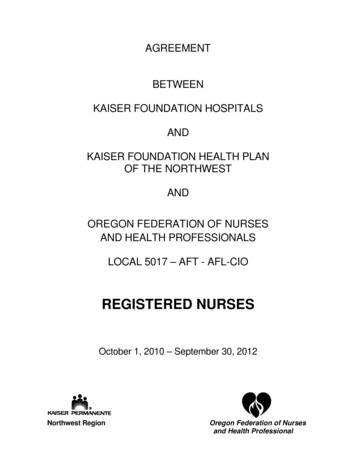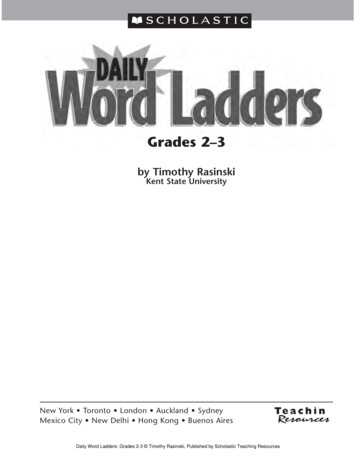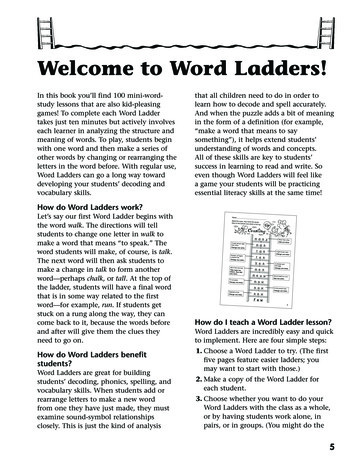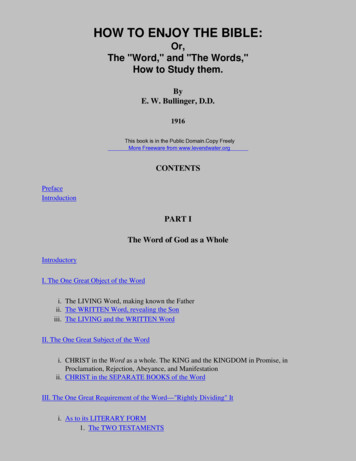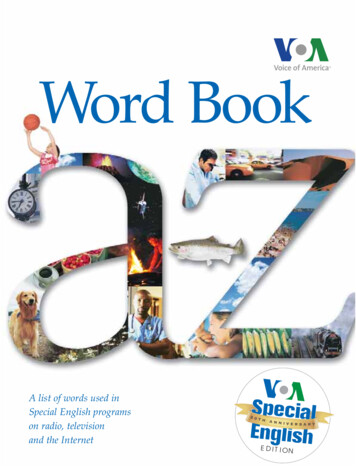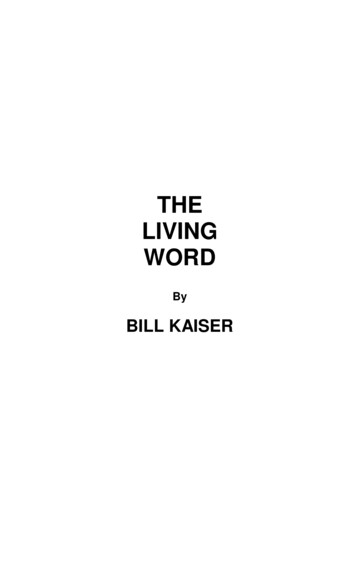
Transcription
THELIVINGWORDByBILL KAISER
All Scripture quotationsfrom the King James Versionof the Bible unless otherwise statedOther books authored or edited by Bill KaiserA Comprehensive Sytudy of RighteousnesAdam, Jesus & Us; Spirit, Soul & Body: aStudy inScriptures.Spirit, A Study in ScripturesWho Is Christ?Who, in Christ, are You?No other GospelFrom the HeartISBN 0-914307-23-1Printed in the United States of America
INTRODUCTIONTHE LIVING WORD is a book about the Word of God. Itis not a book just about the Bible, although muchattention is given to the Bible, its origin and its content.THE LIVING WORD begins by examining what Godmeans when He spoke the word "word", as recorded inthe Bible.Once we have examined the meaning God gives to"word" we will consider the Bible. We call the Bible theWord of God, yet in the literal sense it is a book which isthe record of the Word of God. Who wrote the Bible?Why do we call that collection of Books the Word of God?We will address all of these questions and more.After examining the Bible as the Word of God, we willexamine the idea from John 1:14 that "the word wasmade flesh, and dwelt among us,.full of grace andtruth." When the Word was made flesh in theembodiment of Jesus, what did He say and why did Hesay it? Jesus did far more than teach us new ideas. Bywords, the Living Word was imparted to the hearer.As we begin to see the Word as a living word, we canunderstand Peter, who wrote in First Peter 1:23, "Beingborn again, not of corruptible seed, but of incorruptible,by the word of God, which liveth and abideth forever."Being born again by the Living Word, we become livingepistles of Christ (First Corinthians 3:3).Our lives are message givers. We are letter carriers forGod. Dare we say that we are living letters from God toHis creation? Dare we believe that we are "THE LIVINGWORD?”
CHAPTER 1WHAT IS A WORD?Webster's DefinitionWebster defines a word in many ways. He lists thefollowing:1. A brief expression,2. A promise,3. News, information,4. A password, signal,5. Talk, speech, lyrics,6. Quarrel,7. Speech, sound, or a series of sounds having meaning,8. A letter or a group of letters,9. A saying."Word" used in certain phrases or clichés also helps todefine the meaning "word".Cliché/Phrase DefinitionGood wordPlay on wordsMan of his wordAt a wordWord of mouthHard wordspraisepunpromisespokenrebuke
Household wordIn a wordIn so many wordsIn wordOf many wordsThe Wordto be as good asone's wordto break one's wordto eat one's wordto give one's wordto have a wordwith oneto have no words forto take the words outof one's mouthword for wordcommonshortrestated(or deed)verboseThe Biblefaithfulto take backpromisearguesurprisespeak thoughtsexact quoteFrom these uses of "word" we see several othersynonyms for "word"; namely, those words listed abovewhich have the same meaning. In a word, synonym.Hebrew WordsThere are several Hebrew words translated "word";dabar, peh, pa'ah, imrah, emer, millah, and malal.Certainly dabar is the most frequently used. Dabarmeans a word, matter, thing or cause. It also means toarrange, speak, or subdue.The word peh and pa'ah are less frequently used. Theymean, mouth, blowing part, edge, portion, side, puff, orblow away.Imrah and emer are rarely used. They meancommandment, speech, word, or something said.
Occasionally millah and malal are used meaning a word,a discourse, a topic, to speak or say.Greek WordsThe most frequently used Greek word translated "word"is logos. It means said, topic, reasoning, motive,computation or divine expression.Rhema and rheo are used with less frequency and theymean to utter, matter, topic, speak or say.The word epo is seldom used and it means to speak orsay.Apaggello means to announce, and is infrequently used.God's WordIn John 1:1 we find recorded, "In the beginning was theWord, and the Word was with God, and the Word wasGod." This is a familiar passage of scripture. When weread it we do not always think of what it means. Let usexamine this verse to explore its meaning.The Greek word translated "Word" in this passage islogos. It is also translated, saying, account, speech, orthing. Logos means something said (including thethought); a topic, reasoning, computation, or divineexpression. Keep this in mind as we continue to exploreJohn, Chapter One, verse one.We can test the proper meaning of "Word" in John 1:1 byinserting several different synonyms in the verse whilereading it.
The Bible As The WordWhen one inserts the word Bible for "Word" in John 1:1, itreads, "In the beginning was the Bible, and the Bible waswith God, and the Bible was God." Obviously, Bible is nota valid synonym for "Word" in this verse. The Bible didnot exist in the beginning, for nothing existed in thebeginning before God. The Bible was not God in thebeginning, regardless of what some science fictionwriters imply.The Bible is a book, even a collection of books that aresometimes called "The Book." In the beginning there wasno paper, no ink, and no cows to make leather covers. Allof these elements, man has made from what Godcreated in the beginning.No, we cannot use Bible as a synonym for "Word" inJohn, Chapter One, and verse one.Alphabetic Letters as WordsIf we substitute the idea of letters for "Word" in John 1:1,we must first realize that they are merely graphic symbolsfor sounds. We then make the substitution in the verse bywriting, "In the beginning were graphic symbols, and thegraphic symbols were with God, and the graphic symbolswere God." Here again it is obvious that letters or graphicsymbols are not a valid substitutes for "Word" in John,Chapter One, verse one.In the beginning there was nothing with which to producea graphic symbol. To say that a graphic symbol was Godis also a great distortion of God. God is not an inanimatething. God created us in His likeness and image. We are
like Him. We are alive. God is not a thing. He is the "I AMTHAT I AM," the essence of living beings. (Exodus 3:14)No, graphic symbols are not a valid substitute for "Word"in John, Chapter One, verse one.Audible Sound As The Word.Knowing that books contain graphic symbols (eitherprinted or written) that represent audible sounds, we shalltest the substitution of "audible sounds" for "Word" inJohn 1:1. "In the beginning was the audible sound, andthe audible sound was with God, and the audible soundwas God."Could it be that God is just some unintelligent sound? IsGod just a whistle, a clatter, or a bang? Obviously not.God is an intelligent Being. He is not just some randomsound.Ideas As The WordWe must realize that books contain graphic symbolswhich are grouped together to form words. Thesegroupings of symbols represent sounds, and the differentsounds communicate ideas from one person's head,through their mouth to another. The ears of the secondperson pick up the sounds, and the brain reconstructsthat image or idea in the mind of the person hearing.So we shall substitute image for "Word" in John 1:1. "Inthe beginning was the image, and the image was withGod, and the image was God." This also falls short of thefull truth, but it comes closer to communicating the truthto us than anything else. We could amplify and clarify by
paraphrasing John, chapter one, verse one. "In thebeginning was an image- idea, and that image-idea waswith and in God, and that image-idea was the essence ofGod Himself."This paraphrase is quite consistent with logos, which youremember means; divine expression or divine thought.What is a Word?A word is more than a book. Books are simplystorehouses for graphic symbols. A word is more than acollection of graphic symbols (letters) grouped together torepresent certain sounds. Sounds are simply a means tocommunicate words from the head, through the mouth,into ears, and into listening ears and heads.A word is an idea, a thought concept or image in themind.
Chapter 2GOD'S RECORDED WORDThe BibleWe call the Bible, the Word of God. What do we reallymean when we say that? We mean the Holy Bible is arecord of what God has said to mankind, His creation,through the years. It does not record everything that Godhas said to everybody from the beginning. It does containall that we need to know of God and His Son, JesusChrist. It contains every practical instruction from Godabout living as a child of God in this creation. Of coursewe cannot possibly describe the Holy Bible in such ashort sentence.Collection of BooksThe Holy Bible is really more than one book. It is acollection of sixty- six Books. In the King James Versionand other Bible editions and translations used inProtestant denominations there are thirty-nine Books inthe Old Testament and twenty-seven Books in the NewTestament. There are also fourteen Old Testament bookscalled the Apocrypha (meaning concealed or hidden).These Books are included in Bibles used by someliturgical churches.
In these sixty-six Books there are subdivisions ofchapters and verses. The original manuscripts (which wedo not have), even the earliest manuscripts (which we dohave), do not contain chapter divisions and versenumbers. The Chapters and verses were added to theOld Testament by Cardinal Hugo in the ThirteenthCentury. The New Testament chapter and versenumbers were added in 1551 by Robert Stephens.Interesting 23,144602,5852,728,100Middle BooksMiddle ChapterMiddle VerseProverbsII ThesJob 20Romans 8II Chr 20:17 Acts 27:17Mic & NahPsalm 117Ps 118:8Largest BookLongest ChapterSmallest BookShortest VersePsalmsPsalm 119ObediahI Chr 1:25LukeLuke 1III JohnJn 11:35PsalmsPsalm 119III JohnJn 11:35DifferentWords Used8674562412,143God is usedLord is 83,1373,566,4803,3587,736Five Books have only one chapter: Obediah, Philemon, IIJohn, III John, and Jude.
Old TestamentBook Names1. Genesis2. Exodus3. Leviticus4. Numbers5. Deuteronomy6. Joshua7. Judges8. Ruth9. I SamuelCompiledIsaiah10. II SamuelCompiledIsaiah11. I Kings12. II Kings13. I Chronicles14. II Chronicles15. Ezra16. Nehemiah17. Esther18. Job19. amuelSamuelSamuelDavidNathanGad1600 B.C.1600 B.C.1600 B.C.1600 B.C.1600 BC1550 BC1126 BC1120 BC700 B.C. bySamuelDavidNathanGad700 B.C. EzraNehemiahEzraJob (?)Moses (1)David (73)1046-616 B.C.1046-616 B.C.1279-461 B.C.1279-461 B.C.546-461 BC446-430 BC516-506 BC1840-1700 BC
20. Proverbs21. Ecclesiastes22. Song of Solomon23. Isaiah24. Jeremiah25. LamentationsJeremiah26. Ezekiel27. Daniel28. Hosea29. Joel30. Amos31. Obediah32. Jonah33. Micah34. Nahum35. Habakkuk36. Zephaniah37. Haggai38. Zechariah39. MalachiSolomon (2)Asaph (12)Heman (1)Ethan (1)Korah 0-450 BC1000 BC1000 BC1000 BC792-722 BC685-616 BC616 BC HabakkukZephaniahHaggaiZechariahMalachi622-600 BC616-536 BC781-711 BC795-755 BC679-648 BC899-795 BC853-824 BC772-722 BC786-757 BC679-648 BC679-648 BC557-525 BC557-525 BC557-525 BCNew TestamentBook NamesAuthorsDates40. Matthew41. Mark42. Luke43. John44. Acts45. RomansMatthewJohn MarkLukeJohnLukePaul37 AD57-63 AD58-63 AD90 AD63 AD58-60 AD
46. I Corinthians47. II Corinthians48. Galatians49. Ephesians50. Philippians51. Colossians52. I Thessalonians53. II Thessalonians54. I Timothy55. II Timothy56. Titus57. Philemon58. Hebrews59. James60. I Peter61. II Peter62. I John63. II John64. III John65. Jude66. PaulPaulPaul (?)JamesPeterPeterJohnJohnJohnJudeJohn59 AD60 AD60 AD64 AD64 AD64 AD54 AD54 AD67 AD68 AD67 AD64 AD68 AD45 AD60 AD61-65 AD90 AD90 AD90 AD66 AD96 ADThese are just a few of the amazing statistics of theBible. From them we realize that there must have been ahigher authority controlling the content of His Word withits marvelous unity and internal confirmation.
Chapter 3WHO WROTE THE BIBLE?The Bible is compiled of sixty-six books. The King JamesVersion was written between 1600 B.C. and A.D. 96 aspan of more than 1600 years, by more than thirtyauthors.MosesThe author of the Pentateuch (Genesis, Exodus,Leviticus, Numbers, and Deuteronomy), is said to beMoses. He was born about 1571 B.C., the third child ofhis parents, Aaron and Miriam being older. Exodus,Chapter Two, relates to us the story of his birth.Moses was born an Israelite in Egypt, but was savedfrom slaughter when Pharaoh's daughter found the infantMoses floating in a basket among the reeds of the sea asshe bathed.Therefore, Moses was raised and educated in the courtsof the Egyptian Pharaoh. With such an education, hecould probably read and write and had opportunity tocultivate many other talents.After killing an Egyptian soldier when he was forty yearsold, Moses fled from the prosperity and authority of
Pharaoh's court to the back side of the desert. There hebecame a shepherd, a sharp contrast to his training andlife style to that point in his life. Moses also took himself aMidianite wife at this time.When Moses was eighty, God spoke to him out of aburning bush, sending him back to Egypt to lead Israelout of Egyptian bondage. Meek Moses, ex-prime ministerand murderer, was made a great leader by God to leadthree million people out of bondage.JoshuaJoshua wrote the Book of Joshua. He was born in Egypt,the son of Nun, forty years before the Exodus of theIsraelites. He was forty years younger than Moses.It was Joshua and Caleb, two of the twelve Israelitespies, who brought back the good report aboutpossessing the Promised Land.Joshua was eighty years old when he took the leadershipof Israel vacated by the death of Moses.SamuelSamuel is the son of Hannah, who cried to God for a sonto satisfy her husband. She dedicated that promised sonto God, and he was raised by the high priest, Eli.Because of this he had good rabbinical training.Samuel was the last judge of Israel, and he was used ofGod to install the first king of Israel, Saul.
Samuel authored the Book of Judges and contributed tothe Book of Ruth, First Samuel, and Second Samuel.DavidDavid was the youngest son of Jesse. He was ashepherd boy, poet, musician, and ultimately becameKing of Israel. David was a giant killer, an adulterer, anda murderer as well. We must never forget he was a manafter God's own heart.He contributed to First Samuel, Second Samuel, andwrote seventy-three of the Psalms.SolomonSolomon was the son of David and Bathsheba, possiblythe first son born out of their legal marriage. As the son ofthe shepherd king (David), Solomon received everyadvantage of education available in that day.Solomon was noted for his wealth and wisdom. The factthat he had seven hundred wives and three hundredconcubines should not surprise us, as we remember heis the son of David and Bathsheba.Solomon authored Proverbs, Ecclesiastes, The Song ofSolomon, and two of the Psalms.IsaiahIsaiah was the son of Amos, and supposedly a memberof the royal family. Therefore, he had the advantage ofeducation, being able to read and write. He lived andministered as a prophet during the reign of Uzziah,
Jothan, Ahaz, and Hezekiah, kings of Judah from 772B.C. to 697 B.C. (or possibly 741 B.C. to 686 B.C.).Isaiah wrote the Book of Isaiah, and he contributed toFirst and Second Kings, and First and SecondChronicles.JeremiahJeremiah was the son of a priest, Hilkiah. He was calledto the office of prophet as a young man, a zealous man.Many call him the angry prophet. Because of hispersonality reflected in his writings, we identify zealousanger with the office of prophet. I am not sure Godrequires men to have zealous anger to occupy the officeof prophet.Jeremiah lived and prophesied during the reign of Josiah,Jehoahaz, Jehoiakim, Jehoiakin, and Zedekiah.EzraEzra was a scribe and priest who lived in Babylon about500-450 B.C. He found favor with King Artaxeres toreturn to Israel to fulfill his vision.Ezra contributed to First and Second Chronicles. Hewrote the Books of Ezra, Esther, and possibly Nehemiah.DanielDaniel was a man of noble descent and talents. He livedin Babylon during the reign of Jehoiakim and thus was
contemporary with Jeremiah. He was obviously a man ofspiritual sensitivity to interpret dreams and visions.HoseaThe son of Beeri, Hosea was contemporary with Isaiahand Amos during the reign of Jeroboam II. His propheticzeal was stirred by an unfaithful wife. By this hisprophetic eyes were opened concerning Israel'sunfaithfulness to God.JoelVery little is known of Joel, and the time period of hisprophetic ministry is uncertain. He was the son ofPethuel.AmosAmos was a shepherd and tree trimmer who lived inTekoa, south of Bethlehem. He lived about 704 B.C.during the reign of Uzziah and Jeroboam, which madehim contemporary with Isaiah and Hosea. It wouldappear that he was not from the same advantagedbackground as Isaiah and Daniel.ObediahLittle is known of Obediah. He authored the Book by thesame name, the shortest Book of the Old Testament.Jonah
Jonah was the son of Amittai who lived in Gath-hepherbetween 832 B.C. and 770 B.C. before the reign ofJerobaom II. Little else is known of his life, except whatwe read in his own story of trying to run from God andhow God dramatically returned him the Nineveh in thebelly of a great fish which the Lord had prepared.MicahMicah exercised the prophetical office during the reignsof Jotham, Ahaz, and Hezekiah. Thus, he wascontemporary with Hosea, Amos in Israel, and with Isaiahin Judah.NahumNahum is also somewhat a mystery. Even his place ofresidence is in question. Some surmise that heprophesied during the reign of Hezekiah.HabakkukAuthorities believe that Habakkuk lived and prophesiedduring the reigns of Josiah, Jehoahaz, and Jeroiakim.Other facts are unknown about him.ZephaniahZephaniah was a fourth generation descendant fromHezekiah who prophesied during the reign of Josiah from639 B.C. to 608 B.C.
HaggaiHaggai prophesied in Jerusalem after the return of Israelfrom Babylon. He lived from 600 B.C. to 520 B.C. or so.ZechariahZechariah is the Son of Berechiah and the grandson ofIddo. Some say he was the son of Iddo. He was a priestand prophet.MalachiMalachi prophesied during the time of Nehemiah about432 B.C.Other Old Testament AuthorsMany others contributed to the Old Testament, such asAsaph (wrote twelve Psalms), Heman (wrote one Psalm),Ethan (wrote one Psalm), Korah (wrote ten Psalms), andpossibly Job.MatthewMatthew wrote the Gospel according to Matthew, theGospel to the Jews. He was the son of Alphaeus.Matthew is also called Mattathias, Matthias, and Levi inthe Bible. He lived in Capernaum and served as acustoms tax collector until Jesus Christ called him tofollow Him. As a publican, Matthew was also a collector
of Roman taxes. He lived at least thirty years beyond theDeath and Resurrection of Jesus Christ.MarkMark is the author of the Gospel according to Mark, theGospel to the Gentiles. Many authorities believe thatMark, who traveled with Paul, and John Mark are oneand the same Mark, the Gospel writer.Mark is the son of one Mary of Jerusalem, the one whohoused Peter when he was released from prison. It isquite possible that John Mark was Peter's convert. It isquite possible that Mark's close relationship with Peterhad great influence on the content of the Gospel of Mark.John Mark met Paul through Barnabas who was JohnMark's cousin. His relationship with Paul wasquestionable since John Mark separated himself fromPaul and Barnabas on the first missionary journey.However, Mark obviously joined Paul in Rome during thelater years of Paul's life.LukeLuke, the Gentile physician, is the author of the Gospelaccording to Luke and the Book of Acts. He probably metPaul in Antioch of Syria, Luke's home town, and Paul'schurch home.Luke's command of Greek and his physician's educationmark him as a man of financial means and education.Luke traveled together with Paul to Macedonia and toRome. These travels gave Luke firsthand knowledge towrite the Book of the Acts of the Apostles.
JohnJohn, the Beloved, was the son of Zebedee and Salomi,who ministered to Jesus. He was a fisherman andbusinessman whose home was in Bethsaida on the northshore of Galilee.John was the youngest of twelve and lived to be morethan ninety years old.John wrote the Gospel according to John which issignificantly different than the other three Gospels. It isthe Gospel of Love and, therefore reflects John'spersonality.John also wrote the three Epistles of John and the Bookof the Revelation of Saint John while in exile on the Isleof Patmos between 90 and 96 A.D.PaulPaul, the son of a Pharisee tentmaker, was first known asSaul of Tarsus. His family was prosperous and influentialin Israel in that day.He was trained in Hebrew and Greek culture, and afterhis basic education in Tarsus, went to boarding school inJerusalem to study under Gamaliel, the grandson of thefamous Hillel, the major contributor to the mishna.Saul persecuted the Christians in the early church byauthority of the Sanhedrin, the ruling elders of Jerusalem.While carrying out their orders to return Christians fromDamascus for trial, Saul was stopped by the resurrected
Jesus Christ and surrendered himself to the Lordship ofJesus Christ.Zealous Paul appeared to be God's selected replacementfor Judas who betrayed Jesus.Paul wrote a major portion of what we now call the NewTestament including Romans, First Corinthians, SecondCorinthians, Galatians, Ephesians, Philippians,Colossians, First Thessalonians, Second Thessalonians,First Timothy, Second Timothy, and Philemon.PeterPeter wrote the Letters of First and Second Peter. It isquite possible that he exerted considerable influence onthe Gospel of Mark, since John Mark was his convert andclose friend.Remember, Peter was a fisherman and businessman aswas John. Therefore, he was a practical man, and hewas "results" oriented. He was the intellect andtheologian as Paul was.JamesJames is the author of the Book by the same name.There are several men in the New Testament namedJames. This James was the half brother of Jesus ofNazareth, and the Bishop of the church at Jerusalem.Summary
We have briefly described twenty-eight of more thanthirty contributors to the sixty-six Books of the Bible.Among them are murderers, adulterers, rich men, poormen, intellectuals, laborers, proud, humble, and themeek.I do not point this out to criticize these men, or God, orthe Bible. It is very important to realize the nature andhistory of these men if we are going to understand thenature of God's plan to redeem His creation and thenature of His Word.God chose to send His Word through men, all kinds ofmen for all kinds of reasons. Later in this book we willgive more detail to this understanding, but we introducethe idea here. God's Word is not a collection of laws,statutes, commandments, methods and procedures.God's Word is His Word to His creation, man. ThereforeGod chose to speak to men through men, that men mightreceive it and understand it. God chose to wrap His Wordin mankind.For this reason, God did not write the Bible. The HolySpirit did not write the Bible. God chose to send his ideasto men, who were inspired by the Holy Spirit to write.Men wrote the Bible inspired by the Holy Spirit. The HolySpirit did not write the Bible. Men wrote the Bible as theHoly Spirit gave them inspiration. (I would say this ahundred different ways if I thought it were necessary.However, I believe you get the point.)God chose to use men to write the Bible. Not necessarilymen who qualified in our understanding, but men whomade themselves available to God. Yes, they werechosen of God, but I believe that God chose thembecause they were available to be chosen. These menwere not always Holy in their lives. They were not all
qualified by religious standards. They were not allqualified by natural standards of intelligence oreducation. But they all qualified in God's sight. For thatreason the Bible reflects the realities of life and reveals aGod who is well able to meet us in the reality of our need.For this I am thankful.
Chapter 4THE BIBLE ISTHE WORD OF GODNot all men accept the Holy Bible to be the Word of God.A noted evangelist tells the story of ministering in India.He held up his Bible and said, "This is the Word of God."He thought that everyone would accept this truth, but hewas surprised to find that many Moslems believe that theKoran is the Word of God.How do we know that The Holy Bible is the Word of God?There are countless arguments we could put forth tojustify our claim that the Holy Bible is the Word of God.However, there are just a few arguments which arenecessary to prove our claim. I believe they fall into foursimple categories:1. Experience proves the claims of the Bible.2. The Bible declares itself to be the Word of God.3. The Bible proclaims history before archeologydiscovers history.4. Science is confirming Biblical accuracy.ExperienceProbably the most convincing evidence to theunbelievers that the Holy Bible is the Word of God is
experience. We can experience what the Word of Godpromises. For unbelievers to experience signs, wonders,miracles, and healings that the Bible promises is veryconvincing to unbelievers. They are not only surprised atthe miracles and healings, which are contrary to theirnatural thinking, but even more surprised to find that theywere always promised to God's people in the Holy Bible.This is the kind of proof that the evangelist in India used.As he believed God to heal and work miracles among theheathen, God proved Himself and His Word. Peopleexperienced healing and miracles promised by God inthe Bible. Therefore, they accepted the Bible as the Wordof God.As I experienced the New Birth and saw it in the Bible, Isaw that the Bible promised some benefits in life that Ihad not experienced. Therefore, I began to trust thatthings I found in the Bible which I had not experienced, Icould experience. After finding out that New Birth was aBiblical experience, I then saw that healing was in theBible. I believed that healing was a valid Biblicalexperience for some, but maybe not for me. Then Iexperienced healing, and having experienced thepromise of healing, I saw that the Bible promises healingto all who believe.I then read about the Baptism in the Holy Spirit in theBible. By then I had enough confidence that the Biblewas the Word of God, that I believed that the Baptism inthe Holy Spirit, as well as the gift of tongues, was for mealso. I believed this was God's promise for me evenbefore I experienced it.It is by experiencing the Word of God, that God proves tous that the Bible is His Word.
By accepting the Bible as the Word of God, we find outwhat God has for all of His children; hope takes root, andfaith begins to bring forth the promises of God in our livesto bring glory to God.The Bible Declares Itself To Be God's WordThe Holy Bible states within its own covers that it is theWord of God. By itself this is not sufficient proof that itreally is the Word of God. However, as the integrity of theWord is established in our hearts by experiencing thepromises of God, we believe what the Bible says aboutitself. It is confirmation to us. Since the Bible is truthfulabout the New Birth, healing, and other promises, thenthe Bible is also truthful when it declares itself to be theWord of God.Second Timothy 3:15, 16, says, "And that from a childthou hast known the holy scriptures, which are able tomake thee wise unto salvation through faith which is inChrist Jesus. All scripture is given by inspiration, of Godand is profitable for doctrine, for reproof, for correction,for instruction in righteousness."Second Peter 1:19-21 says, "We have also a more sureword of prophecy; whereunto ye do well that ye takeheed, as unto a light that shineth in a dark place, until theday dawn, and the day star arise in your hearts: Knowingthis first, that no prophecy of the scripture is of anyprivate interpretation. For the prophecy came not in oldtime by the will of man: but holy men of God spake asthey were moved by the Holy Ghost."Of course there are other facts about the Bible thatdeclare it to be the Word of God more directly.
As we remember that it is a collection of sixty-six Bookswritten by some thirty or more authors over a period of1600 years, we marvel at its amazing unity.The fact that these writings, or even copies of thesewritings have been miraculously preserved through thehundreds of years is proof of God's hand upon the Booksof the Bible. Surely countless other tablets, scrolls, andletters were written at the same time as the Bible Books,yet we have no great libraries of these historical writings,for they were not preserved. The Books of the Bible weremiraculously preserved.Another fact about the Bible that confirms it to be theWord of God is the confession of the prophets andauthors who made reference to one another. The first fivebooks (the Pentateuch) are referenced to by:Joshua,Joshua 1:7, 1:8, 8:31, 23:6.David,I Kings 2:3.Solomon, I Kings 8:61.Amaziah, II Kings 14:6.Manesseh, II Kings 21:8.Josiah,II Kings 23:25.Asa,II Chronicles 14:4.Jehoshaphat, II Chronicles 17:9.Jeremiah, Jeremiah 8:8.Daniel,Daniel 9:11, 9:31.Ezra,Ezra 6:18.Nehemiah, Nehemiah 13:1.Malachi,Malachi 4:4.Of course the most important confirmation of the divineinspiration of the Word of God is Jesus Himself. Hedeclared the scriptures would be fulfilled in:Matthew 13:14,Luke 21:22,
John 13:18, andJohn 15:25.Jesus declared that not one tittle of the law would fail inLuke 16:17.Jesus spoke of fulfillment about Himself in Luke 24:2527, 44. He said that His words would not pass away inMark 13:31Jesus Christ made reference to Old Testament Books inMatthew 22:31-32, Luke 4:17-19, and Luke 16:29-31, justto mention a few.The Bible Proclaims HistoryThe integrity of the Word of God is validated by itshistorical accuracy.In this day of secular humanism the creation story isrejected by men,
When one inserts the word Bible for "Word" in John 1:1, it reads, "In the beginning was the Bible, and the Bible was with God, and the Bible was God." Obviously, Bible is not a valid synonym for "Word" in this verse. The Bible did not exist in the beginning, for nothing existed

